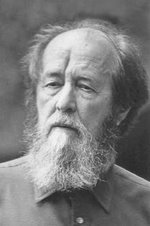What? This has to be the mother of all non-sequiturs, right? Not so.
Surprisingly, the early years of the two men were markedly similar. Everyone knows about Obama’s childhood, the absent Kenyan father and being raised by his white mother and grandparents. Solzhenitsyn never knew his father. Isaaki Solzhenitsyn died in a hunting before Aleksandr was born. Apparently father to be Isaaki was riding in a cart, laid his loaded shotgun down, the cart bumped, the shotgun fell pointing towards the man and went off. Aleksandr’s parents were not both Russians. Isaaki was Russian, his mother was Ukrainian. For us Americans, the difference between Russian and Ukrainian seems insignificant compared to the gulf between black and white. While it likely isn’t as significant, it is different enough, there have been wars and riots and bad blood between Russians and Ukrainians throughout history. And as great as the chasm between black and white is in America, Hawaii has to be the place where this chasm was the smallest.
I wasn’t fully aware of this parallel between the lives of the two men until I read Obama’s
Dreams From My Father. For all the book length biographies of Solzhenitsyn I’ve read, my mental map of his life was shaped by the one sentence biography everyone knows about Solzhenitsyn, he was arrested, survived the Gulag, and was later exiled to the West.
Dreams From My Father is a startlingly vivid tale. Obama may be the best writer for a famous politician since Winston Churchill. But while the writing was vivid, I disliked the philosophy. Obama seemed to be showing that he was marked for life by the absence of his father and by the racial divide in America, and he would never get over what had happened to him. (In Obama’s defense, by the end of the book he narrates how he does come to forgive his father).
One thing I most admire in Solzhenitsyn’s work is the optimism, how in the most horrible of situations he and his characters retain hope and nonetheless resolve to keep living as a human being who respects the truth, rather than yielding to rage or to the pressure to survive at all costs (no matter what it meant to your fellow victims). I was tempted to criticize Obama. “You think missing your father and being black in white culture was tough? How could you have survived the Gulag?” And then it dawned on me, Solzhenitsyn had never known his father either. The central drama of Obama’s life had also happened to Solzhenitsyn. But Solzhenitsyn’s trials kept on after adolescence, there came World War II, then the Gulag, then cancer. So he never had the luxury of writing a book on the absent father or how he had to figure out what it meant to be Russian.
One section in
Dreams From My Father highlights this. Obama was starting as a community organizer, and met a Black Muslim nationalist. He was appalled how Black Muslim ideology demonized whites, but then he thinks it might be necessary. Encouraging blacks to change how they lived might fail, because it sounded like the white recitations of black inferiority. Maybe blacks needed a solid diet of anti-white propaganda to be ballast for their souls so they could handle messages asking them to change. (Dreams From My Father p 197ff ).
Solzhenitsyn always emphasizes truth. While he unsparingly describes the crimes of the Soviets, he does not divide his world into black hearted Communists and victims. One of his most famous quotes is that the dividing line between good and evil goes right through every human heart. The idea that zeks might need to exaggerate how bad Communism was to keep their spirits up as they coped with life after prison is foreign to his thinking. I love (in the abstract) the depth of Solzhenitsyn’s viewpoint on his Gulag experiences, that he writes in the chapter “The Soul and Barbed Wire”. He knows in human terms he was innocent and should not have been arrested. But he understands that before God he is not innocent (of other evils) and the arrest was in some sense deserved. So he concludes “Bless you prison, for being in my life.”
I say ‘in the abstract’ because I am not always calm and impervious in the face of stress and difficulty. Who am I to criticize Obama for not being more heroic like Solzhenitsyn, when I have known neither prison nor the absence of a father? So I offer this as an evaluation, I think Solzhenitsyn’s views on suffering are truer than Obama’s (and Obama’s may have changed after the period he describes in his book). May we each strive to react to adversity more like Solzhenitsyn and less like the young Obama.

